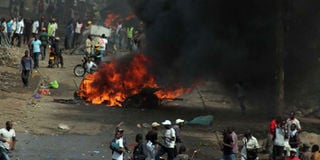We must resolve our divisions for Kenya to have proper peace

Nasa supporters protest along Jogoo Road, Nairobi, on November 17, 2017 during the welcoming of their leader Raila Odinga from a visit in the US. The non-participation of Nasa in the October election was a game changer that goes well beyond Raila Odinga and his ambitions. PHOTO | DENNIS ONSONGO | NATION MEDIA GROUP
What you need to know:
- A democracy is only stable and assured if incumbents can lose power and there is a rotation of leaders.
- The idea that we can have “peace” (or calm) without resolving the issues that divide us will not succeed this time.
Notwithstanding the decision of the Supreme Court this week, only a totally dishonest and/or die-hard partisan can believe that the ‘election’ of October 26 was better than the annulled one of August.
We are yet to know how the Court will justify their bizarre decision given the numerous illegalities, unconstitutional actions and omissions and irregularities that we all witnessed, including an IEBC whose figures for the number of people voting kept on changing even after polls closed and when they were supposed to have firm and final figures from the Kiems kits that cost us millions.
I am certain that over the next weeks and months, some of these illegalities and unconstitutional acts and omissions will get into the public domain, for no matter what the judges say facts are stubborn things.
ELECTIONS
We know that it was only the counties dominated by the Gikuyu and Kalenjin communities that had more than 50 per cent turnout, going by the IEBC’s own figures, and the question of how someone supported by such a small minority can represent the unity and diversity of Kenya will haunt the country for a while.
But most saddening is the fact that with this decision, the Supreme Court has perhaps hammered in the final nail in the coffin for elections as a peaceful and logical way to challenge power in Kenya.
There has only been one election in Kenya where the incumbent has been defeated, in 2002, and the persistent stealing of elections in 2007, 2013 and twice in 2017 is a message that we will have to find other ways to dislodge incumbents from power.
The ‘victory’ of incumbents is not because they are loved or have bettered our lives much.
PROTESTS
So why participate in elections if the result is pre-determined and the election management body is partisan and incompetent?
We have opened the door to non-electoral efforts to unseat incumbents.
These efforts may or may not work, but serious instability will undoubtedly ensue, and blood will flow seeing how the way the police have readapted to their old bad habits.
Let’s be clear: A democracy is only stable and assured if incumbents can lose power and there is a rotation of leaders.
A country that does not change leadership from one party to another, or from one community to others, is inherently unstable and is not a democracy. And interchange between two tribes does not cut it!.
DEMOCRACY
In mostly homogenous democratic countries, the changes are between parties.
In multiethnic states like ours, where no community has an overriding majority on its own, it is then crucial that other communities feel that they have a chance at power, one reason that makes Tanzania much more stable.
It is clear that unlike 2013 when the mantra of “accept and move on” was grudgingly effective, nothing of this sort will occur this time.
Despite the regime supporting “peace industry’s” best efforts, the non-participation of Nasa in the October election was a game changer that goes well beyond Raila Odinga and his ambitions.
RESISTANCE
Non-violent resistance is legal, legitimate and constitutional.
It is meant to be disruptive so as to force those with power to the negotiating table.
As Martin Luther King Jr. wrote in his Letter from Birmingham Jail to fellow clergy who were critical of his work, “Why direct action? Why sit-ins, et cetera?
Isn’t negotiations a better path? You are exactly right in your call for negotiation.
Indeed this is the purpose of direct action. Non-violent direct action seeks to create such a crisis and establish such creative tension that a community that has consistently refused to negotiate is forced to confront the issue.
It seeks to so dramatize the issue that it can no longer be ignored.”
PEACE
The idea that we can have “peace” (or calm) without resolving the issues that divide us will not succeed this time.
And it should not, for that merely postpones the reckoning, festering and increasing tensions and angers.
And who can doubt that the levels of anger and frustration, the divisions in our country are way higher now than they were in 2013 or even in 2007?
As Pope John VI stated, “If you want peace, work for justice.”
Maina Kiai is a human rights activist and co-director at InformAction. [email protected]





